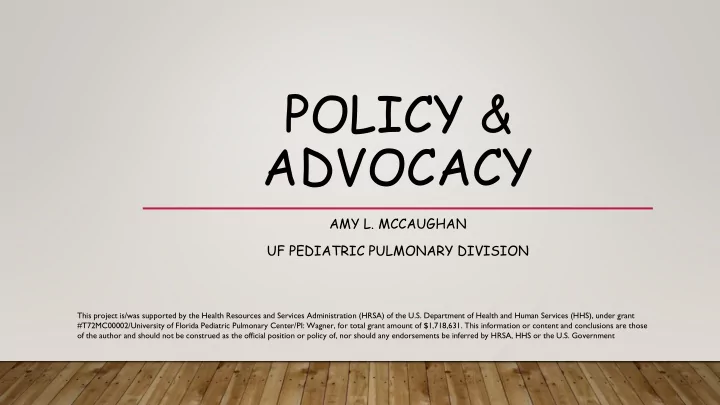

POLICY & ADVOCACY AMY L. MCCAUGHAN UF PEDIATRIC PULMONARY DIVISION This project is/was supported by the Health Resources and Services Administration (HRSA) of the U.S. Department of Health and Human Services (HHS), under grant #T72MC00002/University of Florida Pediatric Pulmonary Center/PI: Wagner, for total grant amount of $1,718,631. This information or content and conclusions are those of the author and should not be construed as the official position or policy of, nor should any endorsements be inferred by HRSA, HHS or the U.S. Government
WHAT IS POLICY? “a high -level overall plan embracing the general goals and acceptable procedures of a governmental body” (Merriam - Webster, n.d.)
POLICY ON A NATIONAL LEVEL (NAEYC, n.d.)
HEALTHCARE POLICY “Health policy refers to decisions, plans, and actions that are undertaken to achieve specific health care goals within a society. An explicit health policy can achieve several things: it defines a vision for the future which in turn helps to establish targets and points of reference for the short and medium term. It outlines priorities and the expected roles of different groups; and it builds consensus and informs people” (World Health Organization, n.d.)
CURRENT HEALTHCARE REFORM POLICIES ON A NATIONAL LEVEL • Revising the Affordable Healthcare Act • Lowering the costs of prescription drugs • Focus on amplifying preventative and wellness services • Increase use of telehealth services • Expand scope of current practitioners (National Conference of State Legislature, 2018)
POLICY ON A STATE LEVEL
CURRENT HEALTHCARE REFORM POLICIES ON A STATE LEVEL • Hope Scholarship offered to those students who are being bullied • Bullied student can choose a public school of their choice or they will receive up to $6,800 a year for private school tuition, regardless of income • First state to give bullied students an option of attending another school (Camera, 2018)
CURRENT HEALTHCARE REFORM POLICIES ON A STATE LEVEL • As of July 1 st , doctor’s can only give a 3 day supply of a controlled substance when a patient is seen in the ER for acute pain. A doctor can give 7 days max if they can justify their reasoning • Prescriptions of controlled meds must be entered into the prescription drug monitoring database by the end of the next day- before July 1, prescribers had 7 days to enter the prescription into the database. • This affects all controlled meds, not just opioids
CURRENT HEALTHCARE REFORM POLICIES ON A STATE LEVEL • Prescribers and pharmacists must check the database before issuing or dispensing any medication • Any person with the ability to prescribe controlled meds must take a medical board approved two hour continuing education class in controlled substances (Scott, n.d)
POLICY IN THE CF DIVISION • Attending weekly meetings • Submit for vacation time • Not coming to work sick • Dressed appropriately • Be honest in time worked • RVU target (relative value unit) • Be respectful of co-workers and culture
POLICY IN PPC • Prepare for core curriculum • Dress appropriately • Be honest in internship hours • Respect time of other specialties in clinic
SUMMARY OF POLICY • Policies affect federal ad state governments • Policies affect private and public agencies • Staying updated with policies is the best way to be effective in advocating for change • CF Foundation- https://www.cff.org/ • State healthcare policies- http://health.wusf.usf.edu/#stream/0 • UF Pediatric Pulmonary Clinic- https://pulmonary.pediatrics.med.ufl.edu/, https://ufhealth.org/specialty/pediatric-pulmonary
WHAT IS ADVOCACY? “the act or process of supporting a cause or proposal : the act or process of advocating” (Merriam- Webster, n.d.)
LEVELS OF ADVOCACY • Micro level- this is an individual level- examples would be applying new theories such as Trauma Focused CBT within the confines of therapy • Mezzo level- practice that affects small to medium sized groups- example would be whether a school district agrees to create a position for a social worker for schools within the school district • Macro level- affecting large systems- an example would be the federal Affordable Healthcare Act and how this bill omitted an insurance companies ability to deny based on pre-existing conditions (Social Work License Map, 2017)
CURRENT HEALTHCARE ADVOCACY REGARDING CYSTIC FIBROSIS • Reaching out to local representative to assist in fighting the funding for CF research and treatment • Petitioning your local representative to join the Congressional Cystic Fibrosis Caucus, which works to works to raise awareness, support research, and advance policies of those living with CF (Cystic Fibrosis Foundation, n.d.)
ADVOCACY ON A SOCIAL WORK LEVEL • Current issues currently being advocated by the National Association of Social Workers: -Affordable Care Act Integration -Child welfare -Social worker safety -Student loan forgiveness -Older Americans Act • All advocacy by the NASW follow use 3 advocacy traits: reimbursement, respect, and resources. (National Association of Social Workers, n.d.)
PERSONAL PURSUIT OF ADVOCACY • National Advocacy Center, operated by the Department of Justice- https://www.justice.gov/usao/training • Advocacy training provided by the offices of victims of crime- https://www.ovcttac.gov/views/TrainingMaterials/dspOnline_VATOnline.cfm • National Children’s Advocacy Center for children of child abuse - http://www.nationalcac.org/ • Healthcare advocacy- http://www.healthpaconline.net/health-care-advocacy.htm • Mental health advocacy- http://www.mentalhealthamerica.net/issues/state- mental-health-america
WHAT DIFFERENCE CAN YOU MAKE? • On a federal, state, or local level? • What policies would you like to see implemented? • What would you advocate for? • What difference do you think you can make?
REFERENCES • Cystic Fibrosis Foundation. (n.d.). Retrieved from www.act.cff.org: http://act.cff.org/ • Camera, L. (2018, March 12). US News. Retrieved from www.usnews.com: https://www.usnews.com/news/education-news/articles/2018-03-12/florida- becomes-first-state-to-offer-bullied-students-vouchers-for-private-school • NAEYC. (n.d.). Retrieved from www.naeyc.org: https://www.naeyc.org/our- work/public-policy-advocacy/federal-legislative-process-or-how-bill-becomes-law • Scott, J. (n.d). Retrieved from www.flmedical.org: https://flmedical.org/Florida/Florida_Public/Docs/FMA-Opioid-HB21.pdf
REFERENCES • National Association of Social Workers. (n.d.). Retrieved from www.socialworkers.org: https://www.socialworkers.org/advocacy/policy-issues • National Conference of State Legislature. (2018, January 1). Retrieved from www.ncsl.org: http://www.ncsl.org/bookstore/state-legislatures- magazine/federalism-hot-legislative-issues-2018.aspx#5 • Social Work License Map. (2017). Retrieved from www.socialworklicensemap.com: https://socialworklicensemap.com/macro-mezzo-and-micro-social-work/ • World Health Organization. (n.d.). Retrieved from www.who.int: http://www.who.int/topics/health_policy/en/
Recommend
More recommend